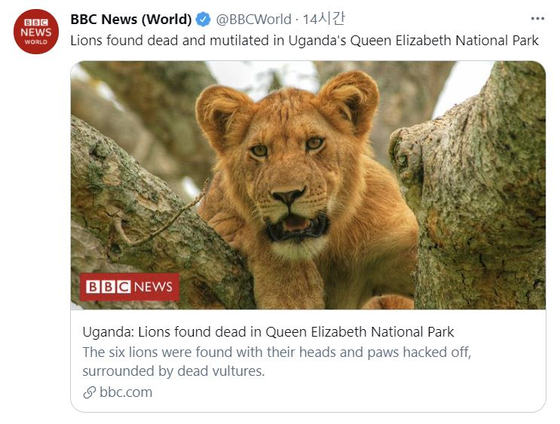![The BBC reported on the 20th (local time) that the bodies of six lions were found in Queen Elizabeth National Park in Uganda, Africa. [BBC 트위터 캡처]](https://i0.wp.com/pds.joins.com/news/component/htmlphoto_mmdata/202103/22/72494071-ac46-4a3a-8a77-cfef0d0c6409.jpg?w=560&ssl=1)
The BBC reported on the 20th (local time) that the bodies of six lions were found in Queen Elizabeth National Park in Uganda, Africa. [BBC 트위터 캡처]
The hunting of wild animals for money and show is constant. In particular, lion hunting continues in Uganda, Africa, where there is a habitat for wild animals. Foreign media such as the BBC reported that six lions were found dead on the 19th in Queen Elizabeth National Park in southwest Uganda on the 20th (local time).
The BBC reported that the dead lions had their heads and legs amputated, and they were believed to have been poisoned because they were surrounded by eagles that died after eating their corpses at the time of discovery. The Uganda Wildlife Management Agency (UWA) said, “Illegal trade in wild animals cannot be ruled out.”
“Nature tourism is an important part of Uganda’s economy and accounts for about 10% of Uganda’s gross domestic product (GDP),” said UWA Director Bashir Hanggi. “This situation also plays an important role in animal protection.” The US Public Radio Broadcasting (NPR) said that “Uganda is generating about 1.6 billion dollars (about 1.08 trillion won) annually from nature tourism. This incident has a negative impact on the tourism industry, the main source of foreign currency in Uganda. It was a tremendous event that could be crazy,” he said.
Wildlife protection groups claim that illegal wildlife trade, poaching, and trophy hunting are the causes of the disappearance of lions in the African continent. In particular, trophy hunting is to hunt wild animals such as lions, elephants, and rhinos for fun and display after obtaining permission. It is said to be called a’hunting trophy’.
There are also observations that the connection to the trophy hunting cannot be ruled out as the heads of the dead lions have been amputated this time. In fact, it is known that African lions can hunt trophies in the grasslands by paying about 50,000 dollars (about 56 million won) to a local guide.
Named after Queen Elizabeth II, Queen Elizabeth National Park is famous for its diverse wildlife ecosystems, including lions, elephants, leopards, and hippos. The world’s wildlife protection organization WildAid surveyed the number of lions in Uganda in 2017 and found that 493 lions, nearly half of which lived in Queen Elizabeth National Park.
There have been several cases of poisoning lions in this park before. In April 2018, 11 lions, including 8 cubs, were found dead with suspected poisoning, and in a similar incident, 5 lions were found dead in May 2010.
Reporter Jeong Young-gyo [email protected]
![]()
